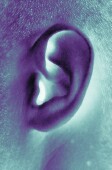 |
 |
 |

Hybrid Cars Pose Risk to Blind, Visually Impaired
Virtually silent engines remove key cue to safety; group seeks legislative help|
|
HealthDay
By Robert Preidt
Monday, July 21, 2008
 MONDAY, July 21 (HealthDay News) -- Because they can be nearly silent, hybrid cars pose a serious threat of injury and death to blind and visually impaired people, says the American Council of the Blind, which is pushing the auto industry and government officials to develop ways to reduce this danger.
MONDAY, July 21 (HealthDay News) -- Because they can be nearly silent, hybrid cars pose a serious threat of injury and death to blind and visually impaired people, says the American Council of the Blind, which is pushing the auto industry and government officials to develop ways to reduce this danger.
"Traditionally, people who are blind or visually impaired learn to rely on their hearing and tactile cues to provide them with information about their environment, which they can use to navigate safely across streets and through other vehicular ways, such as parking lots. In so doing, the sound of traffic is their primary focus," Melanie Brunson, council executive director, said in a news release from the council.
"Traffic sounds provide information about such things as the position of vehicles, their direction of travel, their rate of acceleration, and the speed at which they are likely to move. With this information, the pedestrian can make informed decisions about when to cross a street or other vehicular way safely," she said.
Without those sound cues, a blind or visually impaired person is at serious risk.
"Imagine you are a blind person traveling independently with the aid of your cane, something you have done confidently for years," Dr. Ron Millman, chair of the council's public relations committee, said in the news release.
"You are crossing a fairly busy intersection. You listen for sounds of approaching cars. All cars seem stopped. Suddenly, you hear screeching brakes. Too late, you realize a quiet, nearly silent, hybrid car is only a few inches from you. Panic takes over. Every sense of survival says to run, but where? There is not time to escape as you face this horror and possible life-threatening situation."
But this danger isn't limited to blind or visually impaired people, said Dr. Karen Gourgey, a member of the council's environmental access committee.
"Recent studies have shown that even people who are fully sighted use hearing as well as vision to make street crossing decisions, though they may not realize it. And we haven't even mentioned children and older people," Gourgey said in the news release.
The efforts of the council and other advocates for the blind are having an effect. Last week, the U.S. Federal Highway Traffic Safety Administration held its first public meeting on the issue.
HealthDay
Copyright (c) 2008 ScoutNews, LLC. All rights reserved.
Related News:
More News on this Date
Related MedlinePlus Pages:
| Home | Health Topics | Drugs & Supplements | Encyclopedia | Dictionary | News | Directories | Other Resources | |
| Disclaimers | Copyright | Privacy | Accessibility | Quality Guidelines U.S. National Library of Medicine, 8600 Rockville Pike, Bethesda, MD 20894 National Institutes of Health | Department of Health & Human Services |
Date last updated: 22 July 2008 |




